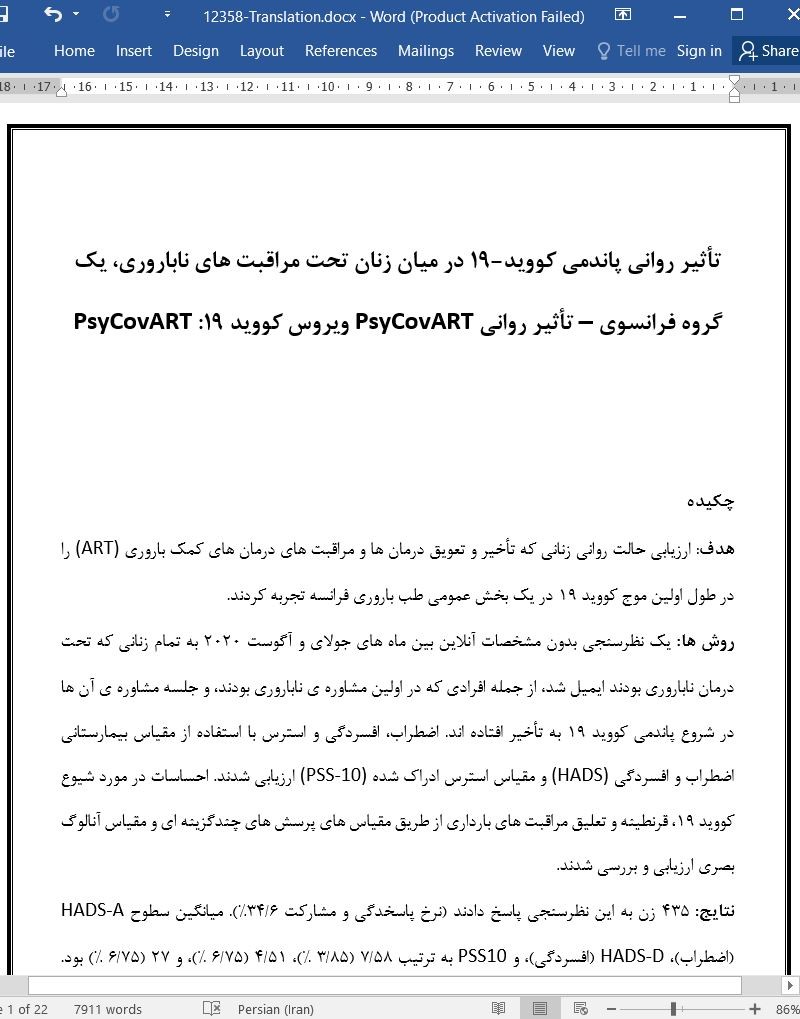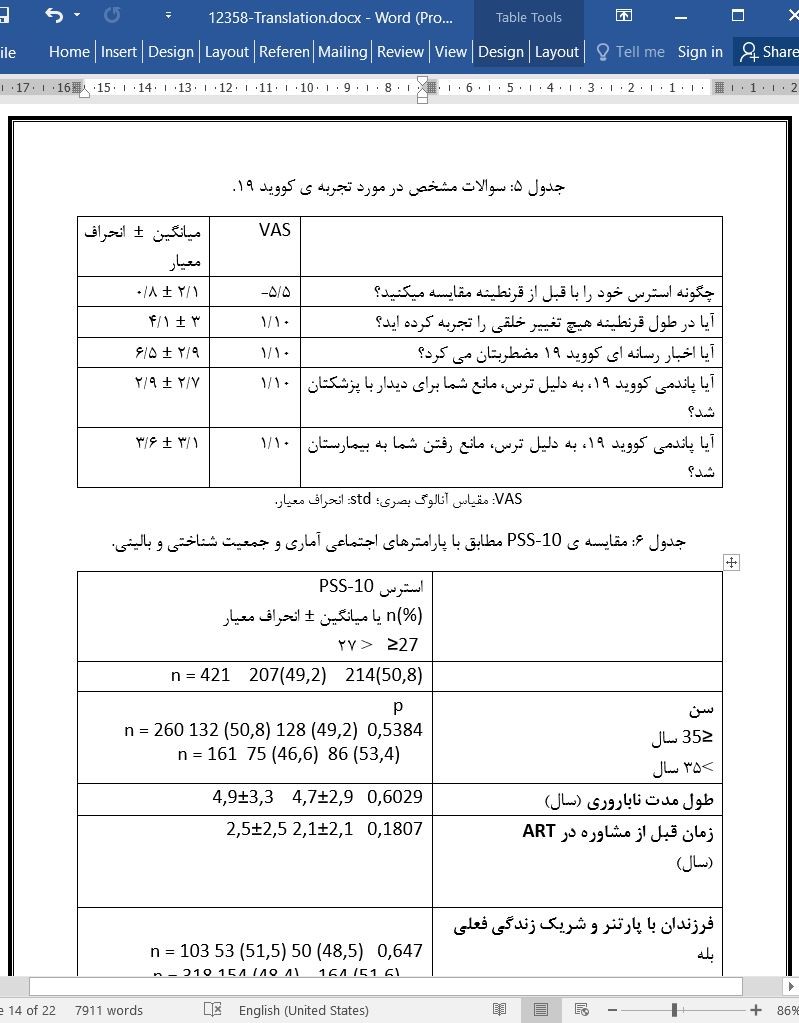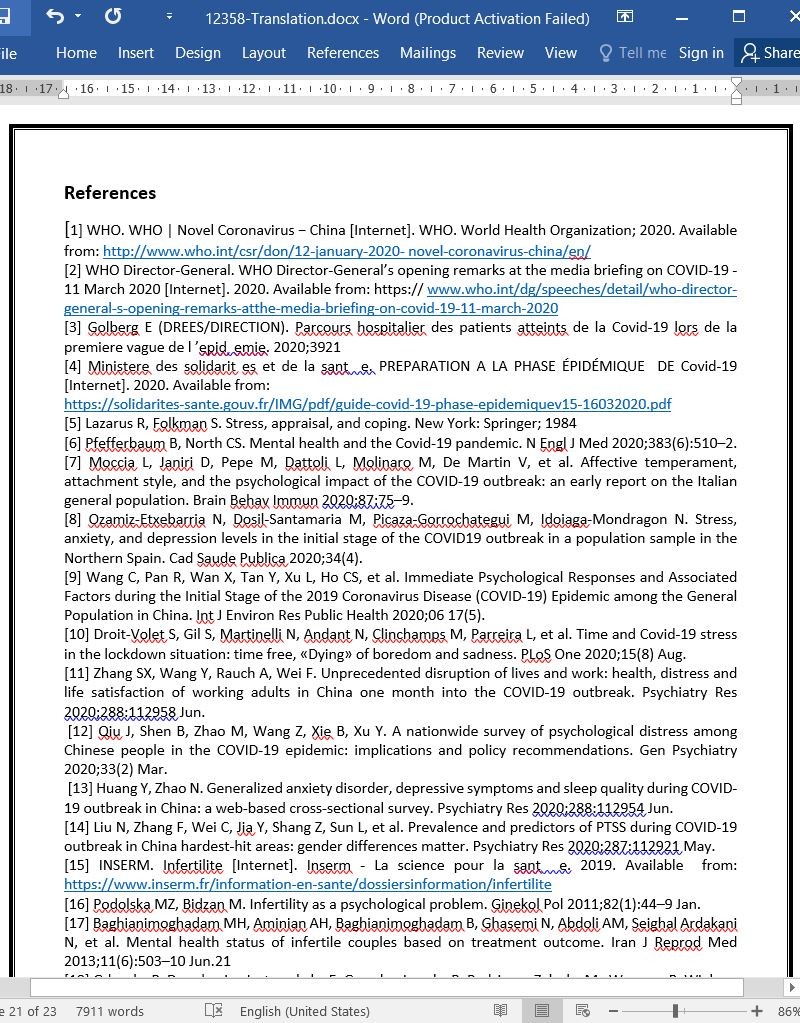
تأثیر روانی پاندمی کووید-19 در میان زنان تحت مراقبت های ناباروری
چکیده
هدف: ارزیابی حالت روانی زنانی که تأخیر و تعویق درمان ها و مراقبت های درمان های کمک باروری (ART) را در طول اولین موج کووید 19 در یک بخش عمومی طب باروری فرانسه تجربه کردند.
روش ها: یک نظرسنجی بدون مشخصات آنلاین بین ماه های جولای و آگوست 2020 به تمام زنانی که تحت درمان ناباروری بودند ایمیل شد، از جمله افرادی که در اولین مشاوره ی ناباروری بودند، و جلسه مشاوره ی آن ها در شروع پاندمی کووید 19 به تأخیر افتاده اند. اضطراب، افسردگی و استرس با استفاده از مقیاس بیمارستانی اضطراب و افسردگی (HADS) و مقیاس استرس ادراک شده (PSS-10) ارزیابی شدند. احساسات در مورد شیوع کووید 19، قرنطینه و تعلیق مراقبت های بارداری از طریق مقیاس های پرسش های چندگزینه ای و مقیاس آنالوگ بصری ارزیابی و بررسی شدند.
نتایج: 435 زن به این نظرسنجی پاسخ دادند (نرخ پاسخدگی و مشارکت 6/34%). میانگین سطوح HADS-A (اضطراب)، HADS-D (افسردگی)، و PSS10 به ترتیب 58/7 (85/3 %)، 51/4 (75/6 %)، و 27 (75/6 %) بود. رواج و درجه شیوع استرس 8/50% بود و تقریبا نیمی از زنان نشانه های اضطراب واضح و گویا یا تلقین کننده را نشان دادند (به ترتیب 6/21% و 7/25%). میزان استرس و اضطراب بیشتر از چیزی بود که در جمیعت نابارور انتظار می رفت. افزایش تنش و استرس در زنان بالای 35 سال و زنانی که چرخه ی درمان را متوقف کرده بودند یا در دوره ی پیش از درمان برای لقاح آزمایشگاهی یا انتقال جنین منجمد بودند مشهود بود. بیمارانی با سابقه ی افسردگی یا اضطراب میزان استرس ادراک شده ی بیشتری را نشان دادند (p= 0.0006). تعویق و به تأخیر افتادن برای زنانی که استرس را تجربه می کردند کاملا غیرقابل تحمل بود (p= 0.0032). بعد از اولین موج پاندمی، میل به بارداری ثابت باقی ماند و 3/84% از زنان خواستار این بودند که مراقبت های بارداری را هرچه زودتر از سربگیرند.
نتیجه گیری: متوقف شدن روند باروری در طول پاندمی کووید 19 تأثیر روانی معنادار و قابل ملاحظه ای روی زنانی با استرس، اضطراب بالا داشت. مشاوره ی روانشناسی و روانی به ویژه در طول این دوره ی سخت و دشوار همواره باید توصیه و ارائه شود.
نتیجه گیری
پاندمی کووید 19 یک موقعیت بی مانند و بی نظیر بود که زندگی روزمره و چشم انداز آینده را تغییر داد.
مطابق با این مطالعه، توقف درمان کمک به ناباروری (ART) در طول قرنطینه کووید 19 به افزایش استرس و اضطراب کمک کرد. زنان بالای 35 سال و آن هایی که درمانشان پیش از برداشتن تخمک یا انتقال جنین متوقف شده بود میزان فشار روانی بیشتر و بالاتری را نشان دادند. علی رغم فقدان آگاهی نسبت به کووید 19 و پیامدهای آن روی بارداری و سلامت جنین در زمان نظرسنجی، میل به باردار شدن و شروع درمان های ART به وضوح نمایان بود.
تأثیر روانی پاندمی کووید 19 روی زنان نابارور نباید نادیده گرفته شود. مشاوره ی روانی خاص باید به زنان و همسران و پارتنرهای آنها پیشنهاد شود. در پرتو یافته های ما، باید از یک تعویق جدید درمان و مراقبت های ART تا حد امکان اجتناب شود.
Abstract
Purpose: To assess psychological state of women who experienced postponement of ART care during the first COVID-19 wave in a French public ward of reproductive medicine.
Methods: An online anonymous survey was emailed between July and August 2020 to all women whose infertility care, including the first consultation for infertility, have been delayed at the beginning of the COVID-19 pandemic. Anxiety, depression, and stress were assessed using Hospital Anxiety and Depression Scale (HADS) and Perceived Stress Scale (PSS-10). Feelings about COVID-19 outbreak, lockdown and suspension of fertility care were assessed by Multiple-Choice Questions and Visual Analog Scales.
Results: 435 women answered to the survey (response rate 34.6%). Mean levels of the HADS-A (anxiety), HADS-D (depression) and PSS10 were respectively 7.58(±3.85), 4.51(±3.48), and 27(±6.75). Prevalence of stress was 50.8% and almost half of women presented clear or suggestive anxiety symptoms (respectively 21.6% and 25.7%). Stress and anxiety rates were much higher than those expected in infertile population. Increased stress was observed in women above 35 years and those stopped ‘in cycle’ or during pre-treatment for in-vitro fertilization or frozen embryo transfer. Patient with history of depression or anxiety had a higher prevalence of perceived stress (p = 0.0006). Postponement was perceived as ‘unbearable’ for women experiencing stress (p = 0.0032). After the first wave of pandemic, pregnancy desire remained the same and 84.3% of women wanted to resume fertility care as soon as possible.
Conclusion: Stopping fertility care during the COVID-19 pandemic had a significant psychological impact on women with an increase of stress, and anxiety. Psychological counseling should always be offered especially during this difficult period.
Conclusion
COVID-19 pandemic was an unprecedented situation which have changed daily life and future perspective.
According to this study, stopping ART treatments during COVID19 lockdown contributed to increase stress and anxiety. Women aged over 35 years old and those whose treatment was interrupted before oocyte puncture or embryo transfer seemed to have a higher rate of psychological distress. Despite the lack of knowledge about the COVID-19 and the consequences on pregnancy and fetus wellbeing at the time of the survey, desire of getting pregnant and starting over ART treatments clearly showed up.
Psychological impact of COVID-19 pandemic on infertile women must not be neglected. Specific psychological counseling should be proposed to women and her partners. In the light of our findings, a new suspension of ART care should be avoided, as far as possible.
چکیده
مقدمه
مواد و روش ها
طرح مطالعاتی
پس زمینه و پیشینه ی بیمار
مقیاس HADS
مقیاس PSS-10
فراخوانی و جذب افراد
اهداف
آنالیز و تحلیل آماری
نتایج
بحث و گفتمان
ثبت نام آزمایشی
نتیجه گیری
منابع
ABSTRACT
Introduction
Materials and methods
Study design
Survey characteristic
Patient background
HADS scale
PSS-10 scale
Recruitments
Objectives
Results
Discussion
Trial registration
Conclusion
References
- اصل مقاله انگلیسی با فرمت ورد (word) با قابلیت ویرایش
- ترجمه فارسی مقاله با فرمت ورد (word) با قابلیت ویرایش، بدون آرم سایت ای ترجمه
- ترجمه فارسی مقاله با فرمت pdf، بدون آرم سایت ای ترجمه



